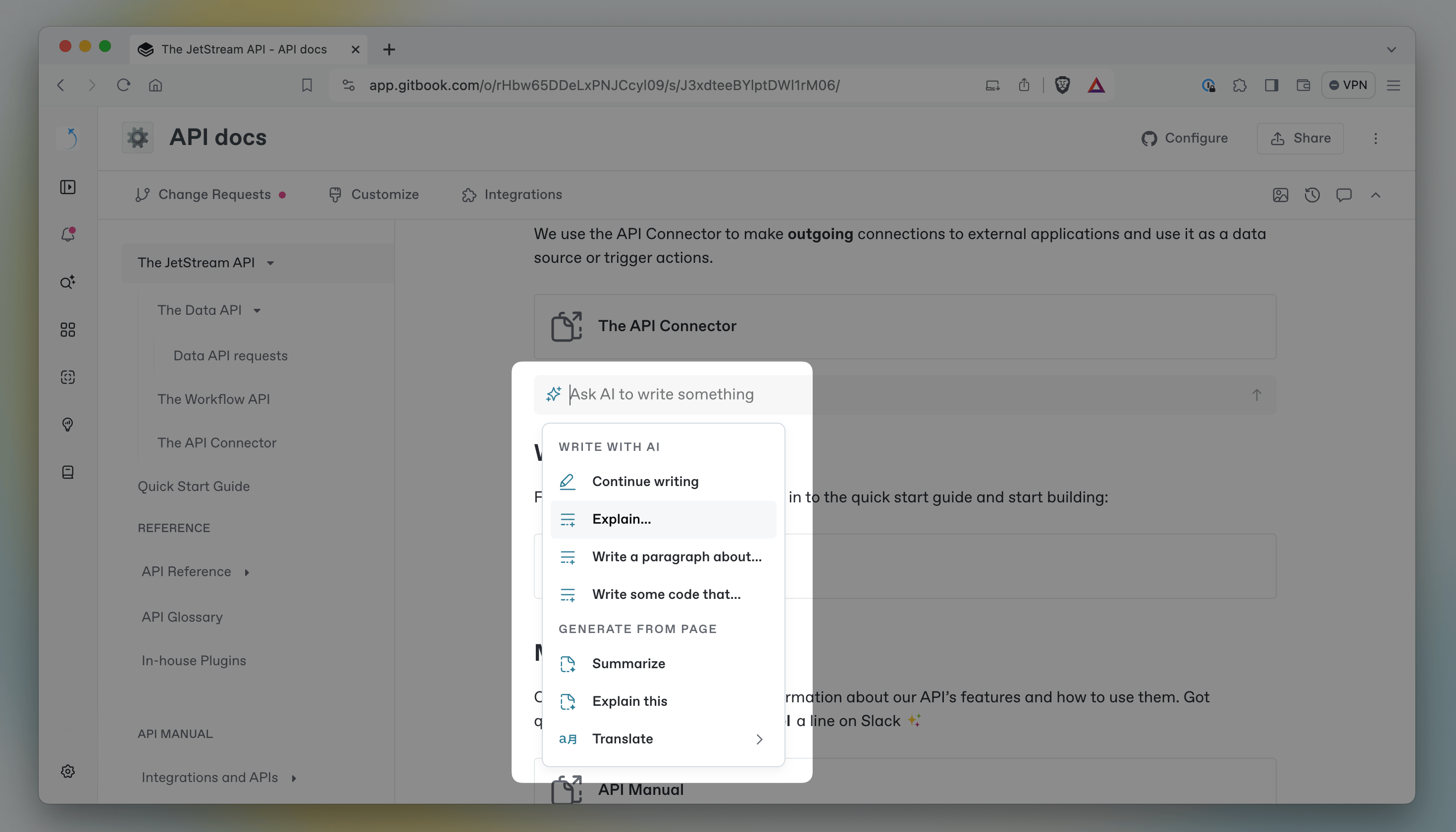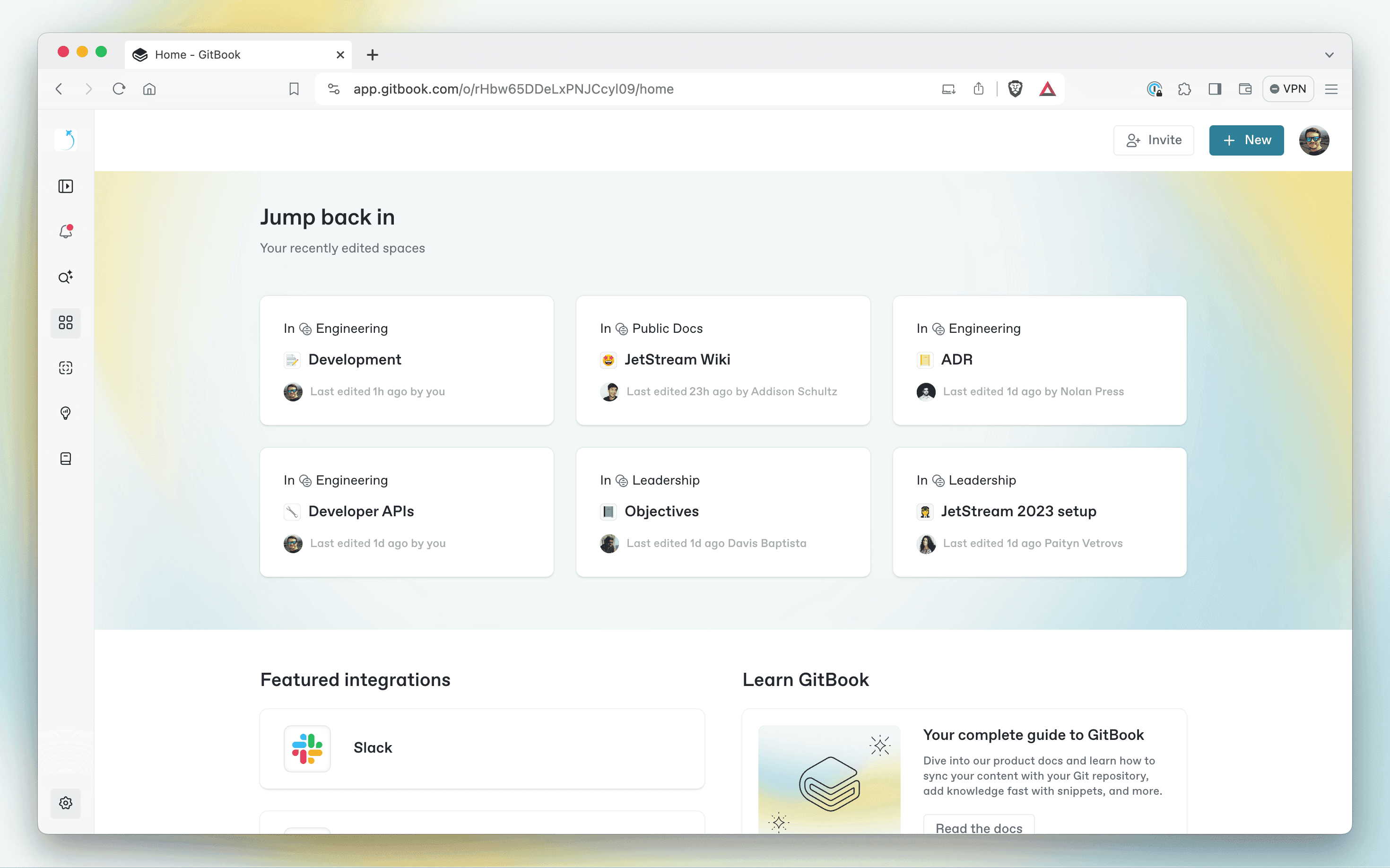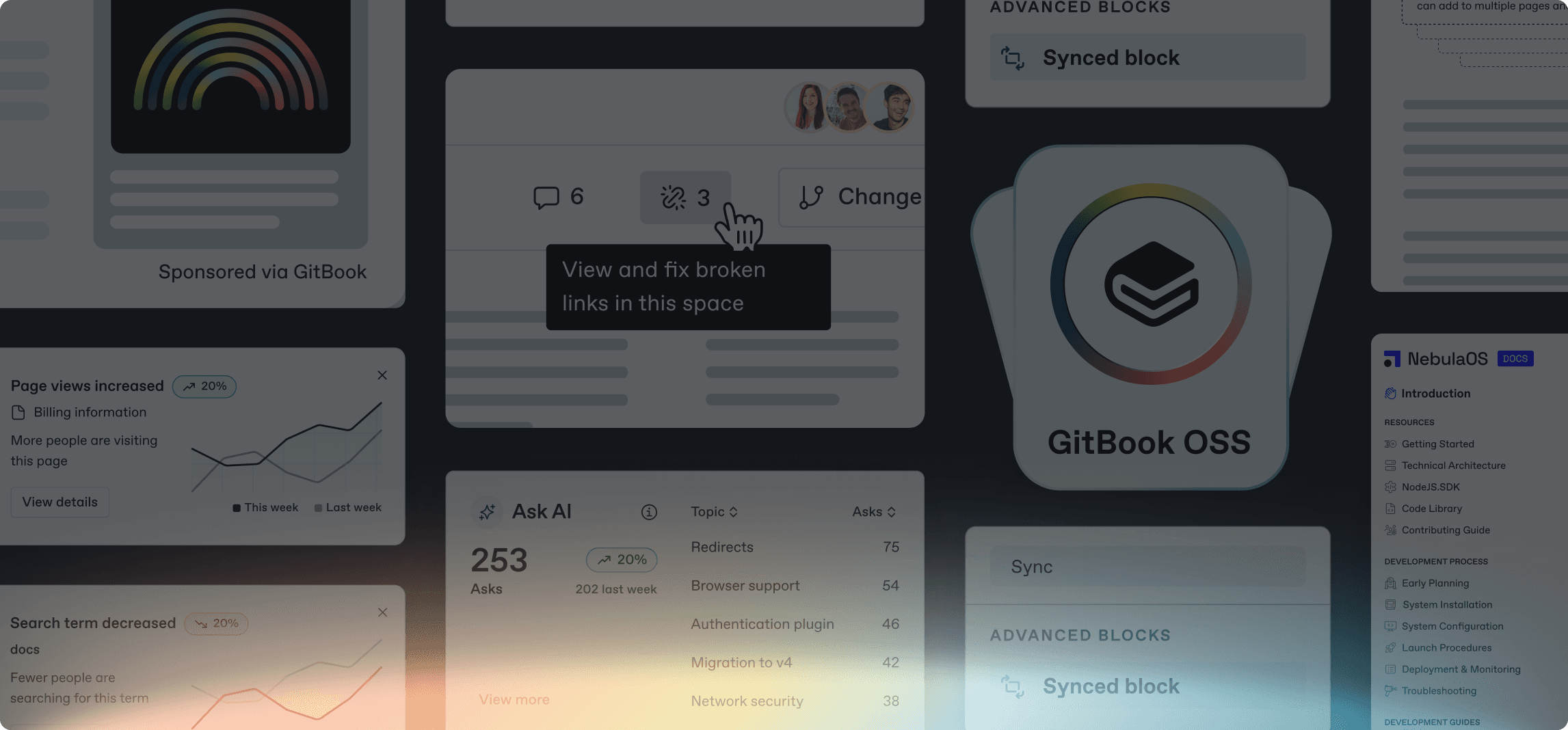
New in GitBook: Write with AI, turn snippets into docs, and more
New in GitBook: Write with AI, turn snippets into docs, and more
Product updates
Product updates
Product updates
2 Feb 2024



Over the past year, we’ve been thinking carefully about the best ways to build AI into GitBook in a way that’s considered and useful, but also seamless. We don’t want to simply tack on AI features so we can say, “Hey look, we have AI too!”.
Last year, we launched our first GitBook AI features. They make finding answers easier than ever in search, and can help you capture complex information from third-party sources like Slack, then convert it into useful documentation.
And now we’re taking things even further — plus, we’ve made some other useful improvements across the app that we think you’ll love.
Use AI to help you write better, faster
GitBook AI has already been helping you find answers to technical questions, and add information to your knowledge base using snippets.
Now we’re taking it even further. From today, GitBook AI can help you write content, summarize information and more — right on your page. Simply start a new line and press Space to bring up the palette.
This first release is all about text generation, and can pull information from the page you’re working on. So you can tell it to expand on existing content, summarize disorganized notes, or even translate your page into another language.
Here are a few things to try with GitBook AI:
Create a list of action items based on a page of notes – Quickly create a checklist of to-dos from a planning document or disorganized notes page.
Explain and summarize complex topics in simple language – Need someone outside your engineering team to understand your technical docs? GitBook AI can translate those complex ideas into simple language.
Create a page template in seconds – Putting together a new process document, RFC, game design document or something else? Save time and let GitBook AI generate a template for you.
Translate your documentation page into another language – Localized user documentation just got a whole lot easier with GitBook AI, right on your page.

The AI writing palette is there to suggest things you might want to try with AI, but the list is by no means exhaustive. You can write any prompt you want — so feel free to experiment!
Soon, we plan to add more prompts to the palette, as well as offer it inline when you select some text. So you could easily ask AI to do things like correct spelling and grammar or translate the text, and you can choose to replace the content right in the same block.
Stay tuned for more on this soon! And if you have an idea for a prompt we could include, let us know in our GitHub community.
GitBook AI is available to everyone now
Right now, GitBook AI writing is launching in alpha — we’re still smoothing out some edges and improving the interface. So while we monitor usage and costs for this new feature, we’re making it available to everyone at no extra cost.
We think this is going to be a game-changer for technical teams who want to speed up their knowledge-sharing workflows. We can’t wait to see what you do with it.
Turn snippets into documentation pages
Snippets are great for capturing raw knowledge and adding it to your knowledge base. And with this release, we’ve added new ways to use that information more effectively.
You can now easily turn snippets into documentation pages in your knowledge base. So when you’ve saved a technical guide from a really helpful thread in your #engineering Slack channel, you can now add it to exactly the right space in GitBook, for everyone to find and use.
Plus, you also reference snippets in your documentation, using either the new snippets block or using a # style mention. So even if you don’t want to turn your snippet into its own page, you can still point people toward it when you need to.
We’ve also made improvements to the editor in the Snippets panel. So when you create or edit a snippet in GitBook, you can use new block types — like images and files. And we’ve removed the need to save changes you make manually — now, any updates you make will save automatically, just like a normal page.
Making Git Sync faster and more reliable
We’ve been working on boosting GitBook’s performance across the board recently, and with this release we’ve made some big improvements to GitHub and GitLab Sync. We’ll be diving into this in more detail with a follow-up post soon, but for now you should notice some nice increases in both speed and reliability when you sync.
A new home for important updates
GitBook can hold a lot of information — and we don’t just mean documented knowledge. Open change requests, comments, work-in-progress edits, and more all add up, and keeping track of it all can be tough.
So we’ve added a new Home section to the sidebar, that highlights important things that might need your attention. That includes reviews on open change requests, replies to your comments, recent page edits, and other big changes you might want to check out.

We have plans to add more useful information to the Home page in the future, so let us know what information you think would be useful to see over on our GitHub community page.
We’re really excited about the updates we’re sharing with you today. We’re especially excited to bring you more useful features using GitBook AI — especially because this is still just the start.
We’ll be working hard to improve things even further in the coming months, so please share your feedback to help us make it the best it can be for you.
Over the past year, we’ve been thinking carefully about the best ways to build AI into GitBook in a way that’s considered and useful, but also seamless. We don’t want to simply tack on AI features so we can say, “Hey look, we have AI too!”.
Last year, we launched our first GitBook AI features. They make finding answers easier than ever in search, and can help you capture complex information from third-party sources like Slack, then convert it into useful documentation.
And now we’re taking things even further — plus, we’ve made some other useful improvements across the app that we think you’ll love.
Use AI to help you write better, faster
GitBook AI has already been helping you find answers to technical questions, and add information to your knowledge base using snippets.
Now we’re taking it even further. From today, GitBook AI can help you write content, summarize information and more — right on your page. Simply start a new line and press Space to bring up the palette.
This first release is all about text generation, and can pull information from the page you’re working on. So you can tell it to expand on existing content, summarize disorganized notes, or even translate your page into another language.
Here are a few things to try with GitBook AI:
Create a list of action items based on a page of notes – Quickly create a checklist of to-dos from a planning document or disorganized notes page.
Explain and summarize complex topics in simple language – Need someone outside your engineering team to understand your technical docs? GitBook AI can translate those complex ideas into simple language.
Create a page template in seconds – Putting together a new process document, RFC, game design document or something else? Save time and let GitBook AI generate a template for you.
Translate your documentation page into another language – Localized user documentation just got a whole lot easier with GitBook AI, right on your page.

The AI writing palette is there to suggest things you might want to try with AI, but the list is by no means exhaustive. You can write any prompt you want — so feel free to experiment!
Soon, we plan to add more prompts to the palette, as well as offer it inline when you select some text. So you could easily ask AI to do things like correct spelling and grammar or translate the text, and you can choose to replace the content right in the same block.
Stay tuned for more on this soon! And if you have an idea for a prompt we could include, let us know in our GitHub community.
GitBook AI is available to everyone now
Right now, GitBook AI writing is launching in alpha — we’re still smoothing out some edges and improving the interface. So while we monitor usage and costs for this new feature, we’re making it available to everyone at no extra cost.
We think this is going to be a game-changer for technical teams who want to speed up their knowledge-sharing workflows. We can’t wait to see what you do with it.
Turn snippets into documentation pages
Snippets are great for capturing raw knowledge and adding it to your knowledge base. And with this release, we’ve added new ways to use that information more effectively.
You can now easily turn snippets into documentation pages in your knowledge base. So when you’ve saved a technical guide from a really helpful thread in your #engineering Slack channel, you can now add it to exactly the right space in GitBook, for everyone to find and use.
Plus, you also reference snippets in your documentation, using either the new snippets block or using a # style mention. So even if you don’t want to turn your snippet into its own page, you can still point people toward it when you need to.
We’ve also made improvements to the editor in the Snippets panel. So when you create or edit a snippet in GitBook, you can use new block types — like images and files. And we’ve removed the need to save changes you make manually — now, any updates you make will save automatically, just like a normal page.
Making Git Sync faster and more reliable
We’ve been working on boosting GitBook’s performance across the board recently, and with this release we’ve made some big improvements to GitHub and GitLab Sync. We’ll be diving into this in more detail with a follow-up post soon, but for now you should notice some nice increases in both speed and reliability when you sync.
A new home for important updates
GitBook can hold a lot of information — and we don’t just mean documented knowledge. Open change requests, comments, work-in-progress edits, and more all add up, and keeping track of it all can be tough.
So we’ve added a new Home section to the sidebar, that highlights important things that might need your attention. That includes reviews on open change requests, replies to your comments, recent page edits, and other big changes you might want to check out.

We have plans to add more useful information to the Home page in the future, so let us know what information you think would be useful to see over on our GitHub community page.
We’re really excited about the updates we’re sharing with you today. We’re especially excited to bring you more useful features using GitBook AI — especially because this is still just the start.
We’ll be working hard to improve things even further in the coming months, so please share your feedback to help us make it the best it can be for you.
Over the past year, we’ve been thinking carefully about the best ways to build AI into GitBook in a way that’s considered and useful, but also seamless. We don’t want to simply tack on AI features so we can say, “Hey look, we have AI too!”.
Last year, we launched our first GitBook AI features. They make finding answers easier than ever in search, and can help you capture complex information from third-party sources like Slack, then convert it into useful documentation.
And now we’re taking things even further — plus, we’ve made some other useful improvements across the app that we think you’ll love.
Use AI to help you write better, faster
GitBook AI has already been helping you find answers to technical questions, and add information to your knowledge base using snippets.
Now we’re taking it even further. From today, GitBook AI can help you write content, summarize information and more — right on your page. Simply start a new line and press Space to bring up the palette.
This first release is all about text generation, and can pull information from the page you’re working on. So you can tell it to expand on existing content, summarize disorganized notes, or even translate your page into another language.
Here are a few things to try with GitBook AI:
Create a list of action items based on a page of notes – Quickly create a checklist of to-dos from a planning document or disorganized notes page.
Explain and summarize complex topics in simple language – Need someone outside your engineering team to understand your technical docs? GitBook AI can translate those complex ideas into simple language.
Create a page template in seconds – Putting together a new process document, RFC, game design document or something else? Save time and let GitBook AI generate a template for you.
Translate your documentation page into another language – Localized user documentation just got a whole lot easier with GitBook AI, right on your page.

The AI writing palette is there to suggest things you might want to try with AI, but the list is by no means exhaustive. You can write any prompt you want — so feel free to experiment!
Soon, we plan to add more prompts to the palette, as well as offer it inline when you select some text. So you could easily ask AI to do things like correct spelling and grammar or translate the text, and you can choose to replace the content right in the same block.
Stay tuned for more on this soon! And if you have an idea for a prompt we could include, let us know in our GitHub community.
GitBook AI is available to everyone now
Right now, GitBook AI writing is launching in alpha — we’re still smoothing out some edges and improving the interface. So while we monitor usage and costs for this new feature, we’re making it available to everyone at no extra cost.
We think this is going to be a game-changer for technical teams who want to speed up their knowledge-sharing workflows. We can’t wait to see what you do with it.
Turn snippets into documentation pages
Snippets are great for capturing raw knowledge and adding it to your knowledge base. And with this release, we’ve added new ways to use that information more effectively.
You can now easily turn snippets into documentation pages in your knowledge base. So when you’ve saved a technical guide from a really helpful thread in your #engineering Slack channel, you can now add it to exactly the right space in GitBook, for everyone to find and use.
Plus, you also reference snippets in your documentation, using either the new snippets block or using a # style mention. So even if you don’t want to turn your snippet into its own page, you can still point people toward it when you need to.
We’ve also made improvements to the editor in the Snippets panel. So when you create or edit a snippet in GitBook, you can use new block types — like images and files. And we’ve removed the need to save changes you make manually — now, any updates you make will save automatically, just like a normal page.
Making Git Sync faster and more reliable
We’ve been working on boosting GitBook’s performance across the board recently, and with this release we’ve made some big improvements to GitHub and GitLab Sync. We’ll be diving into this in more detail with a follow-up post soon, but for now you should notice some nice increases in both speed and reliability when you sync.
A new home for important updates
GitBook can hold a lot of information — and we don’t just mean documented knowledge. Open change requests, comments, work-in-progress edits, and more all add up, and keeping track of it all can be tough.
So we’ve added a new Home section to the sidebar, that highlights important things that might need your attention. That includes reviews on open change requests, replies to your comments, recent page edits, and other big changes you might want to check out.

We have plans to add more useful information to the Home page in the future, so let us know what information you think would be useful to see over on our GitHub community page.
We’re really excited about the updates we’re sharing with you today. We’re especially excited to bring you more useful features using GitBook AI — especially because this is still just the start.
We’ll be working hard to improve things even further in the coming months, so please share your feedback to help us make it the best it can be for you.
Get the GitBook newsletter
Get the latest product news, useful resources and more in your inbox. 130k+ people read it every month.
Similar posts


Get started for free
Play around with GitBook and set up your docs for free. Add your team and pay when you’re ready.



Get started for free
Play around with GitBook and set up your docs for free. Add your team and pay when you’re ready.



Get started for free
Play around with GitBook and set up your docs for free. Add your team and pay when you’re ready.

Documentation
Documentation
Documentation











